|
International Perspectives - November 15, 1999
Anne D. Picker
International Economist, Econoday
Economic Wellbeing
Introduction...
The Bank of England released its important quarterly inflation report and the Japanese government uncovered the details of their ninth stimulus package. The Japanese government continues to try to get their economy out of the quagmire.
Bank of England Inflation Report...
The Bank of England issued its quarterly inflation report last week. This report provides the markets with insight on the Monetary Policy Committee's thinking. In the report the Bank said that inflation would ease next year before picking up again in 2001. The Bank's Monetary Policy Committee (MPC) is predicting that the underlying inflation rate - which has undershot the government's 2.5 percent target for the past six months - would drop below two percent before returning to the 2.5 percent target in two years' time. But the report acknowledges that there are "considerable uncertainties" about its forecasts, with the nine MPC members who are responsible for setting interest rates divided on the likely outcome. Much of the uncertainty centers on the strength of sterling, with members split on whether the pound will remain at its present high value. The report said the Bank's two 25 basis point interest rate increases in the past three months were justified because the medium term outlook for inflation had become less benign. The underlying inflation, the retail price index excluding mortgages, is expected to fall to below two percent over the next year or so, before rising to 2.5 percent by the end of 2001.
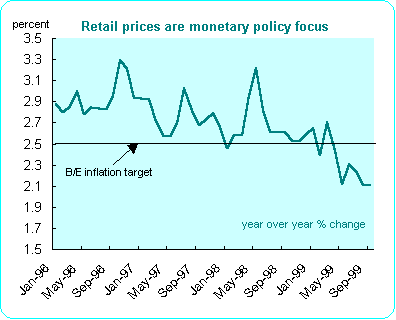
The Swedish Riksbank raised its major interest rate 35 basis points to 3.25 percent effective November 17th. It said that recent conditions suggested inflation would be "marginally higher" than previously forecast due largely to expectations of higher wages. The Riksbank said the increase "creates the conditions for keeping the repurchase or base rate unchanged for the rest of the year."
Bank of Japan Meeting...
The Bank of Japan's Monetary Policy Board left monetary policy unchanged after its meeting Friday.
Another Japanese stimulus package...
Japan's Economic Planning Agency announced its ninth stimulus package aimed at spurring the lackluster economy. The move is expected to boost gross domestic product growth in the current financial year to 0.6 percent, higher than earlier forecasts of 0.5 percent. It is the first time the Japanese agency has upgraded its gross domestic product forecast in 15 years. However, new spending in the package is only about half the total. The other half of the package involves state loans. The fiscal package disappointed the markets. Japan already has spent 100 trillion yen between 1992 and November 1998 in an effort to revive its economy. That helped gross domestic product to expand in the first two quarters of this year after shrinking for five straight quarters.
The Hong Kong Association of Banks left its key deposit rates and 24 hour call rates unchanged at 3.75 percent after its regular weekly meeting. The association's member banks follow any rate changes by changing their own rates.
Indicator Scoreboard
It was relatively quiet on the indicator front last week. The numbers that were released did not surprise, with the exception of German production and retail sales.
Britain
October seasonally adjusted input prices fell by 0.1 percent on the month after rising for the last four months. Lower crude oil prices helped push producer input prices down for the first time since last May, but the overall upward trend appears intact. Nonseasonally adjusted output prices were unchanged on the month but were up 1.9 percent on the year. The main upward thrust came from petroleum products and chemicals. This was offset by declines in food and drink prices
European Monetary Union
The seasonally adjusted unemployment rate remained unchanged at ten percent in September. Spain showed the highest unemployment rate at 15.4 percent followed by France (10.8 percent), Finland (9.8 percent), Germany (9.2 percent) and Belgium (8.9 percent). Luxembourg showed the lowest unemployment rate in September, at 2.8 percent.
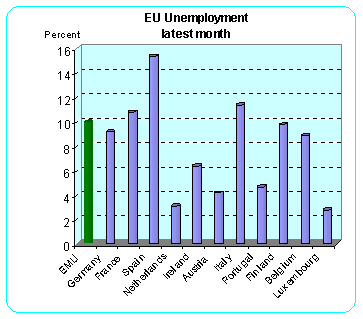
October's economic sentiment index rose to the highest level this year. The overall index stood at 104.3 in October, after 103.8 (revised from 103.7) in September and 103.5 in August. Industrial sentiment rose to -3 from -5 in September, in line with expectations. Consumer sentiment rose to -2 from -4, slightly better than expected. Details of the EMU industrial sentiment indicator show widespread strength.
September industrial producer prices in September rose 0.5 percent on the month and 1.3 percent on the year. The increase was due to a strong rise in intermediate goods prices.
Germany
September industrial production fell 2.5 percent on the month. The decline in German industrial production indicates that recent strong growth in demand is still not fully feeding through into higher output. German industrial production data for September have to be interpreted cautiously due to the unusual pattern of summer holidays this year.
August Exports were up 7.5 percent when compared to August 1998, with strong gains coming in trade with other Euroland countries and United States. During the January to August period this year, total exports were virtually unchanged compared to the same period a year earlier. Exports to the United States soared - up 20.1 percent on the year. Exports to other EMU countries jumped 16.3 percent on the year. Exports to Italy were up 18.7 percent, to France were up 17.1 percent and to the Netherlands up 10.3 percent.
Imports climbed 10.9 percent in August when compared with last year. During the January to August period total imports fell 0.1 percent. August's imports from other Euroland countries rose 14.9 percent when compared with last year. During the first eight months of the year, imports from other Euroland countries fell 1.5 percent on the year.
The September merchandise trade surplus stood at DM11.2 billion, up from the DM10.8 billion surplus when compared with a year earlier and much higher than the DM6.4 billion surplus in August this year. Exports continue to reflect the improvement in the world economy and during September they might have also benefited from the end of the summer holidays.
Unemployment fell a seasonally adjusted 11,000 in October, after two months of increases. September data was revised down to +8,000 from +9,000. The unadjusted unemployment remained below the psychologically important 4 million level, with the unemployment rate easing 0.2 percentage points to 9.9 percent.
September seasonal and calendar adjusted total retail sales including auto and gasoline station sales fell 4.1 percent on the month and 1.5 percent on the year. In nominal terms, total retail sales were down 4.3 percent on the month and 0.9 percent on the year. Excluding auto and gasoline station sales, seasonally adjusted real retail sales fell even more strongly on the year, according to the seasonally adjusted Bundesbank data. Real retail sales fell 4.1 percent on the month and 2.7 percent on the year. Nominally, sales fell 4.0 percent on the month and 2.0 percent on the year in September.
Spain
October consumer price index was unchanged primarily because of a decline in energy prices. The decline offset food price increases. On the year, the CPI is up 2.5 percent.
Asia
Japan
Second quarter gross domestic product was revised down to a gain of 0.1 percent on the quarter from a first estimate of 0.2 percent rise on the quarter. Annualized GDP is 0.4 percent in contrast to the first estimate of 0.9 percent. Consumer spending, which accounts for about 60 percent of GDP, was unchanged at a gain of 0.8 percent on the quarter. Corporate spending on plant and equipment fell 3.9 percent on the quarter, revised upward from the initially reported 4.0 percent fall. Public investment was unchanged at a fall of 4.0 percent while housing investment was also unchanged at a gain of 16.1 percent.
October wholesale prices fell 0.1 percent on the month in October and were down 0.8 percent from the previous year. Chemical and petroleum prices rose but electric power, gas and water, edible farm and fishery products and electrical machinery prices fell. Deflationary pressure on the Japanese economy may be easing, as the data showed that the pace of on-year decline in domestic wholesale prices is beginning to slow. Domestic wholesale prices dropped 0.8 percent on year, the 20th straight month of declines.
September current account surplus fell for the eighth straight month. A stronger yen, higher oil prices and a sharp fall in income from overseas investments drove the current account surplus down 40 percent from a year earlier. A sharp decline in net investment income, which fell 70 percent from a year earlier, pushed contributed to the decline. The surplus was pressured by the impact of higher oil prices on the value of imports, as well as the stronger yen's effect on exports. The data showed exports fell faster than imports, dropping 6.6 percent for the year, while imports fell 5.2 percent.
Australia
October's unemployment rate fell to a seasonally adjusted 7.1 percent from 7.4 percent in September. Employment rose 47,400, over double the 20,000 increase expected by analysts. Full-time job growth has risen for about the fifth consecutive month. Full time employment rose 36,400 over the month. The increase in job advertisements in October was the ninth successive monthly rise. Reflecting the employment gains, the number of Australians filing for jobless benefits fell 1.6 percent in October from September, and was down 8.3 percent from October 1998.
Americas
Canada
October housing starts fell 2.2 percent in October to a seasonally adjusted annual rate of 147,500 units, compared with 150,800 units in September, the Canada Mortgage and Housing Corporation reported. Starts of single detached units in urban areas fell 5.1 percent while multiunit starts rose 0.7 percent.
Financial Markets
The markets were generally higher this week as they took a respite from interest rate concerns. However, by the end of the week, the angst returned as traders' opinions were split on whether the U.S. Federal Reserve would raise rates at its regularly scheduled meeting on Tuesday.
| Selected World Stock Market Indexes |
| Index | 5-Nov | 1999
High | 1999
Low | Week %
Change |
|---|
| Asia |
| Australia | All Ordinaries | 3010.20 | 3145.20 | 2804.80 | 3.10 |
| Japan | Nikkei 225 | 18258.55 | 18357.90 | 13232.70 | -0.52 |
| Hong Kong | Hang Seng | 14189.67 | 14506.74 | 9076.33 | 4.26 |
| S. Korea | Korea Composite | 969.26 | 1027.93 | 498.42 | 6.15 |
| Singapore | Straits Times | 2185.82 | 2222.45 | 1286.56 | 3.52 |
| Europe |
| Britain | FTSE 100 | 6511.60 | 6598.80 | 5770.20 | 2.44 |
| France | CAC |
5141.51 | 5141.51 | 3958.70 | 3.33 |
| Germany | XETRA DAX | 5791.05 | 5802.36 | 4668.50 | 2.53 |
| North America |
| United States | Dow | 10769.32 | 11209.80 | 9120.70 | 0.61 |
| Canada | TSE Composite 300 | 7526.20 | 7297.63 | 6180.30 | 3.13 |
| Mexico | Bolsa |
6034.76 | 6022.86 | 3300.42 | 1.94 |
Equity Markets
Asia
The Asian equity markets ended the week on the positive side with the exception of the Nikkei, which edged down slightly. Below is a graph showing how key Asian markets have performed thus far in 1999.
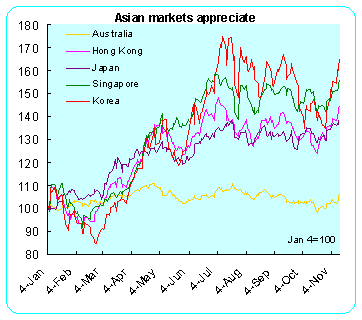
South Korea and Singapore expanded the most during the week with South Korea's benchmark index gaining 6.15 percent on the week following the upgrade in the country's sovereign ratings by Standard & Poor's late Thursday.
Shares in Singapore climbed 3.5 percent, boosted by gains in technology stocks. Investors were inspired to buy into the sector following NASDAQ's ebullience.
The Nikkei closed mixed as investors bailed out of many domestic-oriented issues and bought technology stocks. The market was disappointed by the government's stimulus package introduced on Thursday. Foreigners were net buyers of Japanese stocks for 39 of 44 weeks this year through Oct. 29, according to the Tokyo Stock Exchange.
Europe
Even though Europe's markets had a mixed day on Friday, by the end of the week's trading the three major indexes closed at or near their highs for the year. The markets picked up steam now that interest rate uncertainty was behind them - at least for the Bank of England and the European Central Bank.
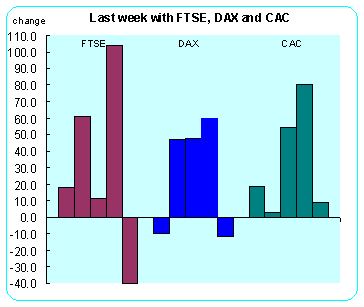
The French CAC closed at its 11th record high in a row, marking its longest record run, as merger speculation and strong corporate results fuelled buying. The CAC 40 closed up 165 points or 3.3 percent on the week In London the FTSE lost 39.8 points on Friday after coming within 50 points of its all time high set in May. The FTSE 100 finished the week at 6,511.6, up 155 points or 2.4 percent. German shares slipped on Friday after the glow of favorable U.S. economic reports faded. On Thursday, the DAX closed at a new high, but lost 11 points on Friday to close out the week at 5,791.05, up 133 points or 2.5 percent.
Currencies
Yen
The yen softened on Thursday after Japan's newest economic stimulus plan failed to persuade some investors it will be enough to spur growth. The new spending was more or less in line with expectations and that caused the yen to slip. Despite the disappointment, the yen closed the week at 105.21, up about a percentage point.
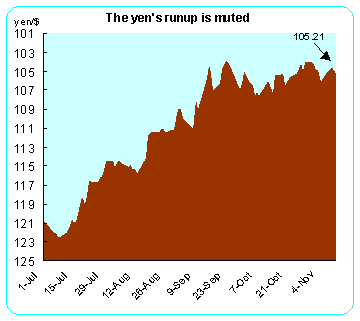
Euro
The euro dropped to a two month low against the dollar after German retail sales dropped in September, damping hopes for faster growth in the euro region's biggest economy. Europe's single currency fell below 1.03 briefly on Friday morning. The euro struggled back up to close the week at 1.0316. It is down about one percent this month. Economic growth in Germany is the second slowest in Euroland behind Italy. Helping the U.S. dollar is the fact that people have gotten more relaxed about asset markets again. The U.S. economy looks strong and the favorable productivity numbers on Friday helped assuage concerns about what the Federal Reserve Open Market Committee might do on Tuesday.
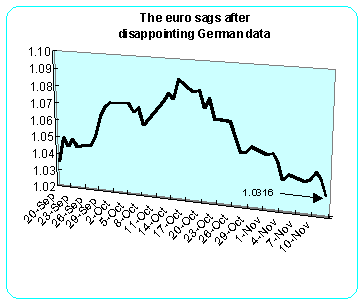
The Swedish Krona strengthened against the euro after the country's central bank raised its key interest rate for the first time in two years to keep inflation in check. The Riksbank raised their primary lending rate to 3.25 percent from 2.90 percent. Although Swedish inflation remains below the Riksbank's target of two percent, the Bank raised rates now to keep inflation from accelerating in the months ahead. Consumer prices rose 1.7 percent in October from a year earlier.
The Canadian dollar continued to rise as traders bet that the interest rate spread between Canada and the United States remains the same. U.S. productivity growth and benign wage cost increases eased concern that the Federal Reserve will boost rates at its Tuesday meeting. Even if the Federal Reserve does raise rates, most investors now expect the Bank of Canada to match the increase and prevent investment from flowing to the United States in search of higher returns. Historically any fear of higher U.S. rates has been negative for the Canadian dollar. But given the strong Canadian economy, most analysts feel that the Bank of Canada will match any Fed increase. So far this year, the Canadian dollar gained 5.2 percent against its U.S. counterpart even though the Bank of Canada has declined to match the two Fed rate increases. Canada's main rate of 4.75 percent now stands 50 basis points lower than the Fed's benchmark. The Canadian dollar has gained because of rising commodity, which make up as much as a third of the country's exports.
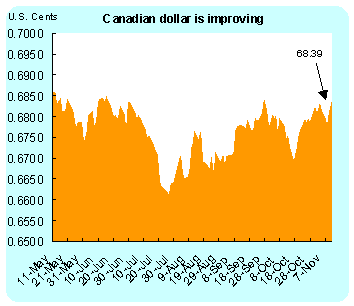
Why U.S. investors care...
Foreign and U.S. investors alike will be waiting for Tuesday afternoon to find out if the U.S. Federal Reserve joins its overseas counterparts and raises interest rates. Despite the mixed economic news last week, especially from Germany, world central banks want to assure the markets that they are vigilant and on inflation watch - and not behind the curve.
Looking Ahead
|
Central Bank Activities |
| Nov 16 | Japan | Bank of Japan Monetary Policy Committee Meeting |
| Nov 16 | United States | Federal Reserve Open Market Committee Meeting |
| Nov 17 | Japan | Bank of Japan Minutes of October 13, 1999 Monetary Policy Meeting |
| Nov 18 | EMU | European Central Bank Governing Council Meeting |
|
The following indicators will be released this week... |
| Europe | | |
| Nov 15 | Italy | Industrial Production (September) |
| Germany | Wholesale Prices (October) |
| Nov 16 | EU | Preliminary Labor Costs (Q2, 1999) |
| | Industrial Producer Prices (September) |
| UK | Retail Price Index (October) |
| Nov 17 | UK | Claimant Count Unemployment (October) |
| Nov 18 | France | Trade Balance (September) |
| Germany | IFO Business Sentiment Index (October) |
| UK | Retail Sales (October) |
| Nov 19 | EU | Harmonized Index of Consumer Prices (October) |
| Germany | Construction Orders (September) |
| Asia | | |
| Nov 15 | Japan | Industrial Production (September) |
| Americas | | |
| Nov 16 | Canada | Survey of Manufacturing (September) |
| Mexico | Gross Domestic Product (Q3, 1999) |
| Nov 18 | Canada | Merchandise Trade (September) |
| | Wholesale Trade (September) |
| Nov 19 | Canada | Consumer Price Index (October) |
| | Retail Trade (September) |
Release dates are subject to change.
For U.S. data releases, see this week's Simply Economics.
|








